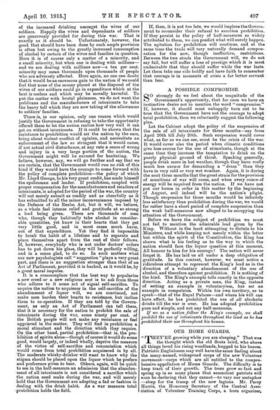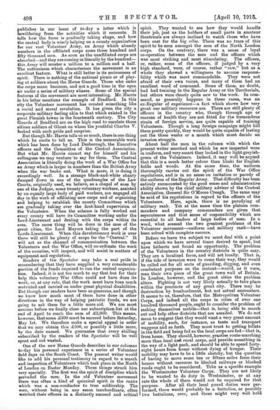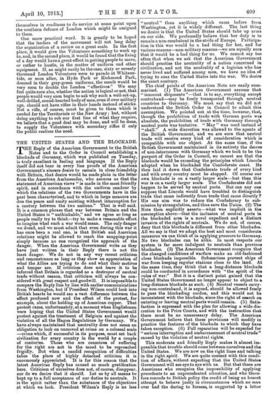OUR HOME GUARDS.
"THEY'RE growing while you are sleeping." That was the thought which the old Scots laird, who above all things loved his rising woodlands, hugged to his bosom. Patriotic Englishmen may well have the same feeling about the many-named, widespread corps of the now Volunteer movement—corps which are all entitled to the compre- hensive appellation of Home Guards. The difficulty is to keep track of their growth. The trees grow so fast and spring up in so many places that somnolent patriots will soon be declaring that they cannot—to vary our metaphor —sleep for the tramp of the new legions. Mr. Percy Harris, the Honorary Secretary of the Central Asso- ciation of Volunteer Training Corps, a born organizer,
publishes in our issue of to-day a letter which is bewildering from the activities which it recounts. It tells how the force is gradually taking shape, and how the central body is wisely helping on a county organization for our vast Volunteer Army, an Army which already numbers in the affiliated corps some three hundred and fifty thousand men. As soon as the unaffiliated corps are absorbed—and they are coming in literally by the hundred— this Army will muster a million to a million and a half. The enthusiasm which characterizes the movement is an excellent feature. What is still better is its seriousness of spirit. There is nothing of the national picnic; or of play- ing at soldiers about the Home Guards. Those who enter the corps mean business, and not a good time in the open air under a series of military aliases. Some of the special features of the movement are most interesting. Mr. Harris in his letter mentions the example of Bradford. In this city the Volunteer movement has created something like a social and moral revolution. It has given the city a corporate military feeling akin to that which existed in the great Flemish towns in the fourteenth century. The City Guards of Bradford are on the high road to emulate those citizen soldiers of Ghent on whom the youthful Charles V. looked with such pride and surprise.
But though Mr. Harris tells us so much, there is one thing which be omits to tell us. This is the memorable work which has been done by Lord Desborough, the Executive officers and the Committee of the Central Association. But what Mr. Harris cannot say for himself and his colleagues; we may venture to say for them. The Central Association is literally doing the work of a War Office for an Army which it; larger in numbers than the British Army when the war broke out. What is more, it is doing it exceedingly well. In a strange black-and-white shanty dumped down in one of the quadrangles of the Law Courts, originally used, we believe, as a chapel of ease by one of the Judges, some twenty voluntary workers, assisted by an equally large body of paid workers, are engaged all day in the work of affiliating new corps and of organizing and helping to establish the county Committees which are gradually taking over the first-band supervision of the Volunteers. When the scheme is fully worked out every county will have its Committee working under the Lord-Lieutenant and dealing with the corps within its area. The same thing will be done in the case of the great cities, the Lord Mayors taking the part of the Lords-Lieutenant. When this devolutionary work is over there will still be plenty of scope for the "Central." It will act as the channel of communication between the Volunteers and the War Office, will co-ordinate the work of the counties, will inspect, and will assist in matters of equipment and regulation. Readers of the Spectator may take a real pride in remembering that they have supplied a very considerable portion of the funds required to run the central organiza- tion. Indeed, it is not too much to say that but for their help this voluntary War Office could not have done its work, or, at any rate, that the work must have been much restricted and carried on under great physical disabilities. But though our readers have been Bo generous, and though we know bow much most of them have done in other directions in the way of helping patriotic funds, we are going to ask them for a little more aid. We are most anxious before we finally close our subscription-list at the end of April to reach the sum of £3,000. This means, however, that some .£300 must be secured before Saturday, May 1st. We therefore make a special appeal in order that we may obtain this .£300, or possibly a little more, by the date named. We guarantee that every shilling subscribed by the readers of the Spectator will be well spent and not wasted.
One of the new Home Guards describes in our columns to-day his personal experience in a series of Volunteer field days on the South Coast. The present writer would like to add his personal testimony in regard to a march and inspection of Volunteers which took place in the North if London on Easter Monday. Three things struck him very specially. The first was the spirit of discipline which pervaded the men. In the old Volunteer movement there was often a kind of quizzical spirit in the ranee which was a non-conductor to true soldiership. The inen, without being in any sense insubordinate, often watched their officers -in a distinctly awned and critical spirit. They wanted to see how they would handle their job, just as the holders of small parts in amateur theatricals are always inclined to watch those who have been cast for the big roles. There was no trace of this spirit to be seen amongst the men of the North London corps. On the contrary, there was a sense of loyal co-operation between the men and the officers which was most striking and most stimulating. The officers, or, rather, some of the officers, if judged by a very high standard, were, of course, rather "raw," but as a whole they showed a willingness to assume responsi- bility which was most commendable. They were not afraid of their own voices, and many of them bad an excellent word of command. Some of them, no doubt, had had training in the Regular Army or the Territorials, but others were clearly quite new to the work. In com- mand, as generally happens in these cases, was an ex-Regular of experience—a fact which shows how very great our military resources are. There are still plenty of officers in the country who, though through age or reasons of health they are not fitted for the tremendous strain of foreign service, are quite capable of training Volunteers. Though a long foreign campaign might kill them pretty quickly, they would be quite capable of lasting out the three weeks or a month which must decide an invasion struggle.
About half the men in the column with which the present writer marched and which he saw inspected were in uniform, and very smart they looked in the light grayish. green of the Volunteers. Indeed, it may well be argued that this is a much better colour than khaki for English fields and woods. At the same time, the uniform thoroughly carries out the spirit of the War Office regulations, and is in no sense an imitation or parody of the uniform of the Regular Army. That difficulty has been entirely surmounted by the good sense and administrative ability shown by the chief military adviser of the Central Association, General Sir 011oore Creagh. The same may be said of his regulations in regard to the officers of the Volunteers. Here, again, there is no parodying of military rank. Yet at the same time the platoon com- manders and company commanders are given that separateness and that sense of responsibility which are essential to all leaders of large bodies of man. In a word, what seemed the two greatest problems of the Volunteer movement—uniform and military rank—have been solved with complete success.
Before we leave t1e subject we must deal with a point upon which we have several times desired to speak, but have hitherto not found an opportunity. The problem of the Volunteers in the country districts is quite easy. They are a localized force, and will act locally. That is, if the tide of invasion were to come their way, they would be called out for all sorts of guarding, digging, and even combatant purposes on the instant—would, as it wave, man their own piece of the great town wall of Britain. In London, however, and the great cities the problem alters. Fighting is not very likely actually to take place within the precincts of any great city. There may he destruction by bombardment, but not actual encounters. It seems to us, therefore, that the Metropolitan Volunteer Corps, and indeed all the corps in cities of over one hundred thousand people, ought to consider the problem of making themselves mobile—that is, being able to march out and help other districts that are assailed. We do not mean to suggest that they would want a very great amount of mobility, such, for instance, as tents and transport waggons and so forth. They must trust to getting billets in the field and being fed as the local corps are fed—that is, from home. They should, however, practise route-marching more than local and rural corps, and provide something in the way of a light pack, and should be able to spend forty- eight &Jura from home without dying of hunger. Their mobility may have to be a little sketchy, but the question of having to move some ten or fifteen miles from their homes without recourse to blocked railways or blocked roads ought to be considered. Take as a specific example the Westminster Volunteer Corps. They are not likely to be wanted to do duty in Westminster, or at any rata the whole of them would not be required for that purpose. After all their local guard duties were per- formed, there would probably be a battalion, or possibly two battalions, over, and these might very well hold
themselves in readiness to do service at some point upon the southern defence of Loudon which might be assigned to them. One more practical word. It is greatly to be hoped that the leaders of the movement will not long delay the organization of a review on a great scale. In the first place, it would give the Volunteers something to work up to, and, in the second place, it would be found that the fixing of a day would haves great effect in getting people to move, or rather to hustle, in the matter of uniform and other equipment. If, as might easily be the case, sixty or seventy thousand London Volunteers were to parade at Whitsun- tide, or soon after, in Hyde Park or Richmond Park, dressed in their grey-green uniforms, the result would be very soon to double the London " effectives." We may feel quite sure also, whether the notion is logical or not, that people would very soon begin to ask why such a well-set-up, well-drilled, sound-hearted body of men, even if over military age, should not have rifles in their hands instead of sticks. Not a rifle, of course, must be given to them which is needed for the Territorials or the New Army ; but, without doing anything to rob our first line of what they require, we believe that a good deal may be done, and will be done, to supply the Volunteers with secondary rifles if only the public realizes the need.








































 Previous page
Previous page